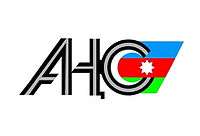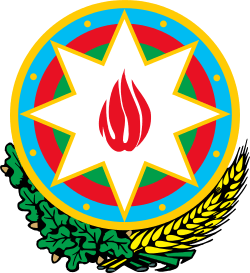Azerbaijani Popular Front Party
Azerbaijani Popular Front Party | |
|---|---|
 | |
| Leader | Ali Karimli |
| Founders | Abulfaz Elchibey |
| Deputy Chief | Bahaddin Gaziyev |
| Founded | 1992 |
| Headquarters | Baku, Azerbaijan |
| Ideology |
Liberalism Reformism Azerbaijani nationalism Liberal conservatism |
| Political position | Centre-right |
| European affiliation | Alliance of Conservatives and Reformists in Europe |
 |
| This article is part of a series on the politics and government of Azerbaijan |
| See also |
The Azerbaijani Popular Front Party (APFP) (Azerbaijani: Azərbaycan Xalq Cəbhəsi Partiyası) is an opposition political party in Azerbaijan, founded in 1992 by Abulfaz Elchibey. After Elchibey's death in 2000, the party split into two factions, the reform wing led by Ali Kerimli and the classical wing led by Mirmahmud Miralioglu.
During 5 November 2000 (and 7 January 2001) parliamentary elections, the party won 11.0% of the popular vote and 6 out of 125 seats in the National Assembly of Azerbaijan. Its candidate Gudrat Hasanguliyev won only 0.4% of the popular vote in the 15 October 2003 presidential elections. At the parliamentary elections of 6 November 2005, APF joined the Freedom (Azerbaijani: Azadlıq) block but won only one seat.
History of the Azerbaijan Popular Front
The Popular Front of Azerbaijan (PFA) was an organisation in Azerbaijan that united a number of informal public organisations into one, working towards independence from the Soviet Union.
The Popular Front of Azerbaijan was established on July 16, 1988 with the initiative of patriotic Azerbaijani individuals as a result of movement of Azerbaijani people for freedom, sovereignty and democracy. PFA came to unite a number of informal public organizations which were established in the 1980s to struggle for the independence of Azerbaijan from the Soviet Union. In 1987 Əli Kərimli, a law school student, became the founder and leader of one of these informal organizations - "Yurd" ("Homeland"), that inspired and led thousands of students to the main square of Baku city to protest against the Communist regime. As a result of this courageous step, a large-scale campaign of public demonstrations and meetings swept across Azerbaijan. Later the movement was suppressed by the special forces of the Ministry of Defense and Ministry of Internal Affairs of USSR. Despite this fact, Popular Front of Azerbaijan was established and Yurd became an integral part of this movement.
In September 1989 the Supreme Council of Azerbaijan (SC), under pressure from PFA and its members in the SC, adopted the law on "Economic Sovereignty of Azerbaijan Soviet Socialist Republic". As the result of an ongoing and unabating struggle under the leadership of PFA, the courage and defiance of Azerbaijani people in the face of Soviet oppression were recognised and celebrated across the former Soviet Union and around the world. In order to stop the growing popularity of PFA, and to stop the bloody pogroms of Armenians that left more than 130 Armenians dead, in January 1990, Soviet authorities sent the army into Baku city. Some 130 civilians were killed and 600 wounded. The main purpose of the Baku operation, headed by Dmitriy Yazov - Minister of Defense of former USSR, was to destroy the political structures of PFA. Some believe that the Communists' plans failed because PFA was a truly national movement and the event only served to strengthen people's trust in the organisation and spelt the end of Soviet power in Azerbaijan.
In 1992, Abulfaz Elchibey, the leader of PFA, won the country's first ostensibly democratic presidential elections. A period of political, social and economic reforms followed. The laws on political parties, freedom of press, education and others were adopted. The country chose a pro-western liberal economic course and implemented successful monetary policy with the establishment of national currency. The most popular innovations were the administrative reforms and the reforms directed towards the creation of civil society. As the result of firm and consistent policies of PFA, Russian (formerly Soviet) army was withdrawn from Azerbaijan in April 1993. Azerbaijan became the first republic in the former USSR and one of the first in the former Socialist bloc which succeeded in achieving a full and unconditional withdrawal of Russian troops.
However, independent and pro-western policy of PFA government could not satisfy geopolitical interests of Russia and Iran and hence, with the support of these countries, former communists led by the former KGB General Heydar Aliyev captured the power. The president Abulfaz Elchibey was forced to leave the capital city. Thousands of people were arrested; members of PFA became victims of political terror. In fact, this was the second largest attack on PFA in order to destroy this organization completely, while the leader was out of the capital city. Although, at a later stage the new regime assumed a pretense of democracy it was clear that Azerbaijan once again was in grip of authoritarianism.
Transformation to political party
Considering the dramatic and difficult situation facing PFA, Ali Karimli took the initiative by leading and protecting the organization from the attacks of the new regime from 1993 until 1997 and restoring its political power. In 1995 with the proposal of Ali Karimli and as a result of internal party discussions, Popular Front of Azerbaijan was reorganized from a social-political movement into a full-fledged political party. In the same year, Popular Front Party of Azerbaijan (PFPA) managed to take seats in Parliament and Ali Kerimli became a leader of parliamentary party fraction.
In 2000, after the death of PFPA Chairman and ex-president A. Elchibey, Ali Karimli was elected Chairman of the Party. In 2000 parliament elections PFPA took seats again and Ali Karimli was elected the leader of the opposition fraction in parliament.
2003 Presidential elections in Azerbaijan were marred by vote-rigging and fell far short of the most basic international norms and standards. They were followed by another wave of repressions against the opposition. Despite this PFPA has recovered quickly.
As 45 percent of the population of Azerbaijan is living under the level of absolute poverty, the major goal of PFPA is to accelerate economic, political, social and legal reforms, based on European principles.
A major objective of PFPA is to promote a liberal model of economic development by implementing a comprehensive anti-corruption programme, rapidly developing non-oil sectors of the economy and creating an ideal climate for foreign and domestic investment through establishment of a flexible tax regime and other relevant measures. PFPA takes pride in their commitment to social justice and development of sustainable social security and welfare policies is a major priority. PFPA seeks an active integration of Azerbaijan into EU and NATO. PFPA sees the future of Azerbaijan in the Euro-Atlantic community. However, it is impossible to accomplish these reforms with the old team of the current regime that has been in place practically unchanged since 1993.
Consequently, PFPA first suggested and then proclaimed the unification of opposition as the surest means to free and fair elections. On 18 March 2005 Popular Front Party of Azerbaijan (PFPA) has signed an agreement with other opposition parties on the establishment of a united opposition bloc – "Freedom" - for the participation in the parliamentary elections in November 2005.